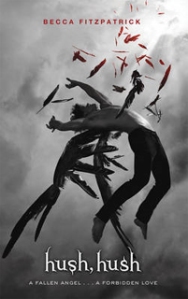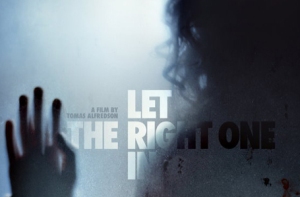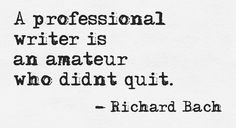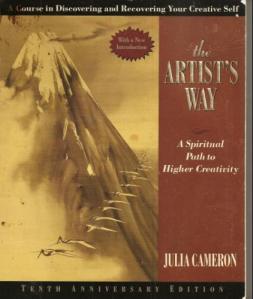Being home for summer, you have to get creative to keep yourself entertained. And I figured a good way to keep busy would be to start putting a dent in the infinite stack of books I have purchased but not read.
I decided on Hush, Hush by Becca Fitzpatrick. I bought this book a while back. It was on sale for $5 at Barnes and Noble in honor of the upcoming release of the final book in the series. The book had a really interesting cover and a great sale price. The synopsis written on the back cover was interesting enough for me to seal the deal.
So here’s the plot, in a nutshell: Awkward high school girl, Nora Grey, is assigned a new lab partner in biology. He is elusive, uncooperative, and refuses to answer any of her questions. She figures out that his name is Patch, but that’s about all she learns. He’s tall, dark and handsome, and despite being endlessly frustrating, she finds herself strangely attracted to him. He begins showing up at the same places she is, claiming it was coincidence. She later finds out that he is something more than what he seems. Their romance plays out in a gloomy, rainy locale (for example: Maine or Washington.)
Does this sound familiar to anyone? Nora Grey is basically a reinvented Bella Swan. Nora is more annoying than the book version of Bella, but less annoying than the movie version of Bella. Patch and Nora meet in biology class, just like Edward and Bella. Patch descends into frustratingly mysterious behavior, also just like Edward. Nora’s friend Vee Sky is seemingly intended to be the comedic relief, but just comes off as kind of annoying, not unlike Jessica Stanley in Twilight. Nora gets into trouble when she travels to a nearby town, Portland, only to be rescued by her elusive love interest. Maybe it’s just me but that sounds strikingly similar to when Bella gets scared in the alley while on a trip to Port Angeles, only to have Edward come to her rescue in the nick of time. There was no secret in beginning Twilight or Hush, Hush that the male leads were superhuman.
I don’t know about you, but when I read Twilight, I knew Edward was a vampire from the beginning. I read the book before all the hype began to generate from the movie, so there weren’t endless spoilers everywhere I turned. It just wasn’t that hard to figure out. As for Hush, Hush, all you had to do to realize that Patch was a fallen angel, was look at the cover of the novel. If there was any doubt left in your mind, the summary on the back would surely clear it up for you.
There were some good things about this book, and some bad things. I think Becca Fitzpatrick does a good job of creating this Hush, Hush world that readers just fall into. Some may disagree, but this book was a page turner for me. I finished it in just a couple hours. While it was easy to read, that doesn’t mean the story was great. It most definitely doesn’t mean that the story was original. I am certain I would’ve appreciated this book if it was the first of its kind. I read Twilight when I was about 12 years old, and I was completely enamored by it. I had never read anything like it. Now, 7 years later, Barnes & Noble has a section dedicated solely to “paranormal romance.” Hush, Hush just seems stale. It was entertaining and I enjoyed reading it, but books like that are a dime a dozen. There wasn’t really anything special about it. I intend to read the rest of the books in the series (Crescendo, Silence, and Finale.)
This is the summary from the back of the novel, if you want a better idea of what the story is about:
When Nora and Patch are forced together as lab partners, Nora would rather fall to her death than put up with his elusive answers to her questions, his teasing, and his infuriatingly handsome face and hypnotizing eyes. It seems Patch was put on earth just to drive her crazy. But before long, Nora’s defenses start to break down as her curiosity about Patch heats up. Why does he always seem to be wherever she is and know exactly what she’s thinking? How does he know what to say to both attract and repulse her? And what is up with those V-shaped scars on his chiseled back? As their connection grows stronger, Nora’s own life becomes increasingly fragile. Nora needs to decide: Is Patch the one who wants to do her harm or the one who will keep her safe? Has she fallen for one of the fallen?
Upon doing a little research for this post, I learned a film adaptation of Hush, Hush is in the very early stages of production (fingers crossed for Thomas Dekker to play Patch.) Patrick Sean Smith, writer behind ABC Family’s Greek, has been commissioned to write the script for the film. If you want to get ahead of the movie hype, now is your chance.
If you enjoyed Twilight, and are just looking for a quick, easy read, Hush, Hush isn’t a bad choice. If you’re looking for groundbreaking literature, I don’t think I need to tell you to look elsewhere.




“There’s No Job Security in Writing.”
Posted: June 24, 2014 in UncategorizedTags: addiction, blessing, blood, book, brain, brainstorming, characters, christmas, college, comment, creative, creative writing, creativity, critical, criticize, doctor, english, family, feelings, fiction, formula, frustration, job, keys, laptop, love, major, math, memorize, novel, novella, opinion, passion, plot, practice, problems, science, security, share, story, storyline, storytelling, talent, teacher, tips, title, training, tricks, typewriter, typing, words, write, writer, writing
You’re catching up with extended family at a Christmas get together. When you’re home for winter break, all your family members are asking, “how is school going?”
Then your aunt asks the question you’ve been dreading.
“What’s your major?”
You sigh, because you know it’s coming. “English,” I answer. I brace myself for what is sure to follow. I always hope there will be just a nod of approval, but that is never the case.
“What are you planning on doing with that major? Are you going to be a teacher?”
(There was a whole day of my life, when I was in 7th grade, that I wanted to be a teacher. After serving as a student assistant to a 3rd grade teacher for one hour a day for one semester, that notion had vanished. If you don’t think teachers are underpaid, I highly recommend sitting in on a classroom for a day.)
“No, I want to be a writer…”
They just look at you for a moment, trying to formulate their response as best they can. If they’re trying to be polite, their response is usually something along the lines of, “wow, that’s a tough industry.” At a glance you may think that they’re admiring your determination, but they’re silently evaluating your audacious, risky career choice.
The bolder, less polite family members may give you something like this: “A writer? Hm, not much job security in that. Good luck, though.”
Sigh.
I’m not trying to be a jerk here, really. I love my family and I know they mean well, but are they expecting their comments to give me some sort of revelation? It’s as if they’re expecting me to have an epiphany right before their eyes as I shout, “by George, you’re right! I need to get started on a med school application ASAP!”
I mean, technically they are right. There isn’t a lot of job security as a writer, or any job in the entertainment industry for that matter. However, there are a few things about writing that only writers will understand. And it is precisely these things that make being a writer worthwhile.
As a doctor, you would be taught about diseases, symptoms, diagnoses, procedures and treatments. The majority of a doctor’s arsenal of knowledge is learned.
Imagine if your doctor said, “I believe that your memory loss and seizures are occurring because you have a brain tumor. I haven’t been to medical school, so I’m not exactly sure how to interpret your MRI to pinpoint the location of the mass, but if you let me cut open your head and get a better look at your frontal lobe, I’m sure I’ll find it eventually.”
I think I’ll get a second opinion, but thanks anyway, Doc.
Medicine is a science; I believe that writing is an innate ability.
Sure, you can learn to diagram sentences, how to spell, and how to properly punctuate your writing. All that is very important, but if any of you are writers, I would be willing to bet that you’ve always been somewhat inclined to it; it comes easier to you than the kids who prospered in Geometry, while you struggled to understand Pythagorean Theorem.
(Maybe you were good at both writing and math, but I like to assume that the world is not that unfair.
-Sincerely, I have never made an A in math.)
I’m not saying that formalized training isn’t important as a writer, because it is. Practice, guidance, constructive criticism and encouragement help writers’ skills to flourish. However, I can’t think of a way to teach someone to be creative. There’s no book to memorize that holds the key to imagination. There’s no formula that will give you creativity when you solve for x. Creativity is 100% your own, and that’s what makes it so special. If you were blessed with creativity, cherish it. Use it. It was given to you for a reason.
Writers and non-writers can both agree that writing is not a job.
To writers, though, the reason we don’t consider it a job is because it’s simply doing what we love. It was a little known talent that fell into our laps. With a little practice, it turned into a hobby. With experience, it turned into an addiction.
If you’re truly a writer, writing does become a sort of addiction. The good kind, mostly.
The more you write, the more your fingers ache to reconnect with the keys the minute you walk away.
Some days it makes you feel hopeless. You sit down and nothing happens. You try to write, because you know you can, but it’s all garbage. You walk away clouded with frustration. Better luck next time.
Other days, the days that writers live for, words flow from your fingertips like blood from a vein. You get lost in your writing. Sometimes I feel as if it traveled from my mind to the page so quickly I wasn’t even fully aware of what I was writing. However, you know better than to stop. Finally you’ve emptied your heart, mind, and soul onto the paper. You step back to read what you’ve written. Sure, there are some spelling errors, you’re missing a few commas, and since your protagonist does not yet have a name, all the places where his or her name should be is the name of your favorite pet. It’s exactly what you wanted. You keep re-reading it, adding apostrophes and quotation marks as you go. You’ve read through it close to fifteen times now, but you don’t mind.
This is what I wish I could convey to all those people concerned with a writer’s job security.
If writing is important to you, then you understand the little things like that, which make writing worthwhile. All the stress over a title, creating the perfect characters, and crafting a story that is worthy of them. When it comes down to it, none of that matters. When you look at a finished product, I guarantee you won’t feel bitter about all the problems you had creating it. You will feel accomplished and infinitely proud. And let’s face it, it’s something that non-writers will never understand.
Leave me a comment and let me know how you guys deal with negative influence about writing, and what makes it all worthwhile to you!
Thanks for reading!